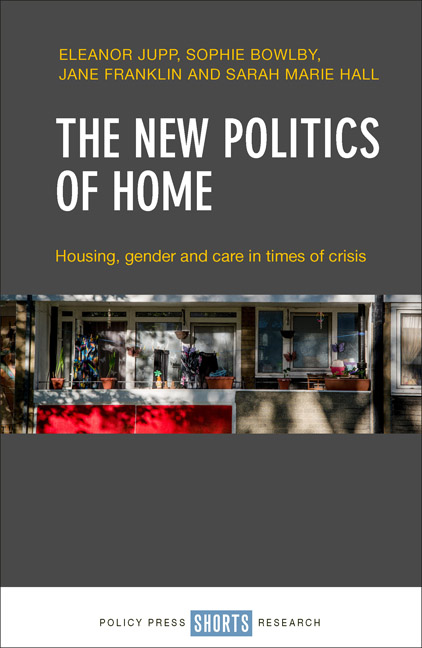Book contents
- Frontmatter
- Contents
- Notes on the authors
- Acknowledgements
- one Introduction: the new politics of home
- two Home economics: home and care in neoliberal policy
- three Caring in domestic spaces: inequalities and housing
- four Relational biographies in times of austerity: family, home and care
- five Spaces of care beyond the home: austerity and children’s services
- six Conclusion: opening up the politics of the home
- Notes
- References
- Index
six - Conclusion: opening up the politics of the home
Published online by Cambridge University Press: 30 April 2022
- Frontmatter
- Contents
- Notes on the authors
- Acknowledgements
- one Introduction: the new politics of home
- two Home economics: home and care in neoliberal policy
- three Caring in domestic spaces: inequalities and housing
- four Relational biographies in times of austerity: family, home and care
- five Spaces of care beyond the home: austerity and children’s services
- six Conclusion: opening up the politics of the home
- Notes
- References
- Index
Summary
Seeing and sensing the politics of the home
This final chapter draws together some of the conceptual, methodological and normative threads from preceding chapters to point towards ways to reimagine home and care within research and also in wider politics. A key concern across all chapters has been around public and private spheres, and by extension questions of visibility and invisibility. How do questions of the politics of care and home come to be both ‘sensed’ and ‘seen’, at a range of personal and political levels? When and how do certain conditions become a matter of ‘public’ concern? As discussed at the opening, this links to questions of what gets identified and named as a ‘crisis’.
As a recent and related example from the field of housing shows, crises may be variably visible and invisible. The idea that there is currently a ‘housing crisis’ within the UK is not controversial (Edwards 2016), and the phrase is routinely used in news and policy reports. The causes of this crisis, clearly geographically and socially very uneven, include the loss of social housing via various mechanisms and the role of globalised finance capital in house purchase contributing to an ever increasing gap between income and house prices (Watt and Minton 2016; Hodkinson 2018). Yet, for a national crisis, it remains largely invisible to many people, literally behind ‘closed doors’, neither seen nor felt by sections of the population who have access to secure housing and the means to continue to access it.
However, on 14 June 2017, the fact that there was a crisis in housing in the UK became dramatically and horrifically apparent. A fire swept through a 24- storey block of social housing, Grenfell Tower in west London, killing 72 residents and destroying the homes of many more. The block had been recently refurbished, and it became apparent that this largely cosmetic refurbishment had been completed without due regard for the safety of residents, and indeed concerns had been pointedly ignored. The tragedy shone a light on the costs of the fragmentation of housing provision and services mentioned above.
- Type
- Chapter
- Information
- The New Politics of HomeHousing, Gender and Care in Times of Crisis, pp. 107 - 114Publisher: Bristol University PressPrint publication year: 2019



